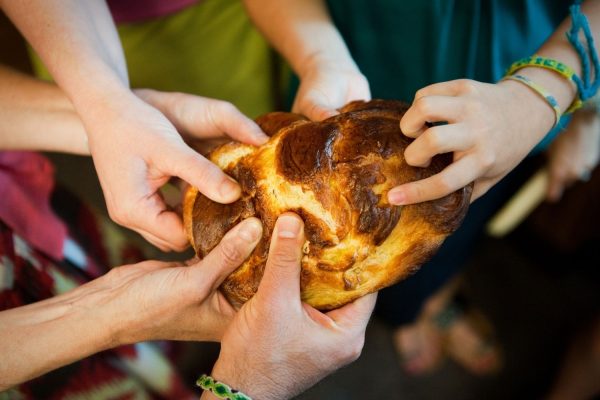The meditation is based on a “Tension Release” practice that has its roots in Kashmir Shaivism, a branch of Hinduism. But it’s for all people, and doesn’t require adherence to a system of belief. I have adapted it to roughly correspond to the four worlds of kabbalah, for a Jewish context. It is particularly appropriate to Pesakh, but can be done any time, including as a daily practice.
I’ll guide you through the first few rounds, but you are also welcome to do your own meditation practice, and just be part of the co-created meditative consciousness.
Meditation
Every year, before Pesakh, we are commanded to prepare our homes by getting rid of all the hametz, to start fresh and clean, to sweep out all the gunk and crumbs. We can do the same thing with the homes called our bodies, where we store a lot of aches, pains, annoyances, disturbances, stresses, maladaptive habits, etc.
I invite you now to get comfortable in your seat, feel your feet firmly on the floor, your buttocks on the seat, and allow your spine to be lifted as if you had a string on the top of your head that was being pulled up toward the heavens. It’s very important to allow your arms to dangle loosely at your sides and have your hands spread out and fingers splayed.
I invite you to think of a positive word or Energy, such as Yah, Adonai, Shekhinah, Shalom, Ahavah, something you would experience more of if you had freedom from the things your are enslaved to. For all four worlds, we will be using this positive word (and our breath) as the source of power/energy to sweep through our bodies and direct all the traif, drek, shmutz, and hametz down our arms and out through our fingers on the out breath. You may feel a warm, tingling sensation, or a sense of sludge as you do this or you may not notice a difference. Allow whatever happens to be OK.
Round 1 – Physical body scan – broom
Releasing body tensions and distractions of things you have to do. Start at your feet and work your way up the body, part by part, paying particular attention to any part that feels constricted. Breathing deeply, think, “breathing in (Shalom or positive word), breathing out, releasing shmutz” (3–4 min).
Round 2 – Mind/Thoughts – dust rag
Breathing in Yah (or other positive word) and dusting out worries, fears, repetitive thoughts anything you are holding onto that belongs to someone else; any thoughts that are keeping you in a restricted state of being; any ego puffery. Don’t think too hard about it, just whatever is present at this moment. Think, “breathing in (Shalom or other positive word), breathing out, releasing mental shmutz” (3–4 min).
Round 3 – Emotions – water
Wash away difficult emotions, irritations and annoyances, stored grief, any core negative beliefs that narrow how you view yourself or the world (3–4 min).
Round 4 – Spirit/ Essence – feather
Allow the breath to be very refined, like a baby’s breath, and imagine a feather brushing away anything that remains that is blocking you from essence, from oneness, that is keeping you in Mitzrayim. Allow the breath to travel to the hidden corners and whisk away any remaining particles. Focus on air cleansing and purifying your body, your mind, your heart, your spirit, your soul (3–4 min).
Shake out your hands/arms, releasing your internal hametz. Sit quietly observing your new-found sense of freedom and spaciousness, focusing on the breath (8–10 min).
Used by permission of author.










